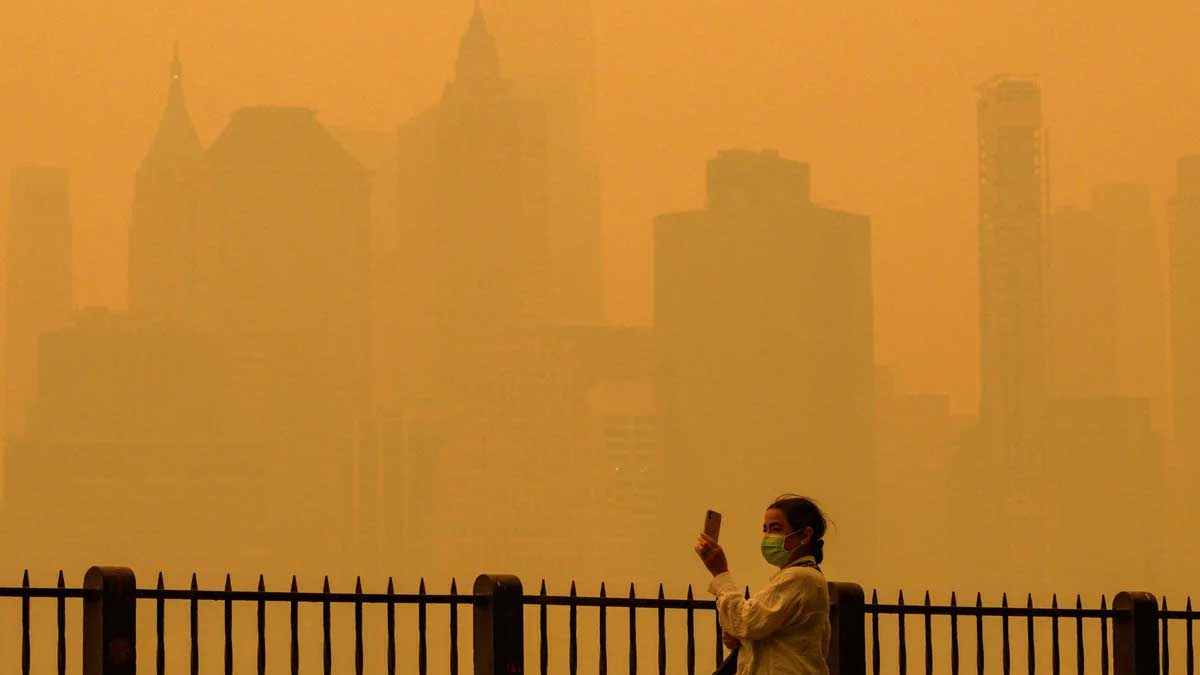- Home
- Billionaires
- Investing Newsletters
- 193CC 1000
- Article Layout 2
- Article Layout 3
- Article Layout 4
- Article Layout 5
- Article Layout 6
- Article Layout 7
- Article Layout 8
- Article Layout 9
- Article Layout 10
- Article Layout 11
- Article Layout 12
- Article Layout 13
- Article Layout 14
- Article Sidebar
- Post Format
- pages
- Archive Layouts
- Post Gallery
- Post Video Background
- Post Review
- Sponsored Post
- Leadership
- Business
- Money
- Small Business
- Innovation
- Shop
Recent Posts
11,000 U.S. Deaths Linked to Wildfire Smoke Annually

Wildfires have become a growing concern across the United States, with climate change driving an increase in both their frequency and intensity. While these extreme weather events are often associated with the destruction of forests and threats to wildlife, their impacts on human health are equally severe. A recent study reveals that wildfire smoke is linked to over 11,000 deaths each year in the U.S., largely due to the presence of fine particulate matter known as PM2.5.
PM2.5, or particulate matter with a diameter of less than 2.5 micrometers, is a dangerous pollutant that can penetrate deep into the lungs and bloodstream, causing various health complications. These tiny particles are a major component of wildfire smoke, which has become a growing threat not only to those living in the immediate vicinity of wildfires but also to populations hundreds or even thousands of miles away. According to the new study, the far-reaching effects of wildfire smoke are responsible for a significant number of premature deaths across the contiguous United States.
The researchers behind the study emphasize that much of the prior research on the health effects of wildfire smoke focused on the western U.S., where large-scale fires are most common. However, this study expands the scope by highlighting the long-distance travel of wildfire pollutants, which can affect human health far beyond the fire’s origin. “Pollutants from wildland fire smoke can travel long distances from the source, potentially affecting human health thousands of kilometers away outside the West,” the study explains.
The study specifically investigates the effects of PM2.5 exposure from wildfire smoke on mortality rates. The researchers found that prolonged exposure to this pollutant was linked to a wide range of non-accidental deaths, including those caused by cardiovascular diseases, ischemic heart disease, digestive issues, endocrine disorders, diabetes, mental health conditions, and chronic kidney disease. The study further notes that the mortality burden is particularly high among people over the age of 65, who are more vulnerable to the harmful effects of PM2.5.
On average, the researchers estimate that 11,415 non-accidental deaths per year are directly attributable to wildfire smoke, with PM2.5 being the primary culprit. The study suggests that wildfire smoke accounts for a substantial portion—about 25%—of total PM2.5 concentrations in the United States. This marks a sharp increase compared to past decades, as the size of areas burned by wildfires has quadrupled since the early 2000s.
The health implications of wildfire smoke extend beyond physical ailments. Previous studies have linked smoke exposure to a range of mental health disorders, including depression, anxiety, post-traumatic stress disorder (PTSD), and anger management issues. Furthermore, smoke exposure has been associated with increased child mortality, exacerbated cardiovascular diseases, and even a rise in deaths related to COVID-19. Most of these studies, however, focused on short-term exposure to wildfire smoke. This latest study takes a more comprehensive approach by examining the long-term effects of exposure to wildfire-related PM2.5 over a 12-month period in 3,108 counties across the U.S., spanning from 2007 to 2020.
The study’s lead author, Kai Chen from the Yale School of Public Health, and his colleagues found that average exposure to wildfire smoke over the past year significantly increased the risk of mortality from a variety of causes. Notably, the researchers found that exposure to PM2.5 over time impairs cardiovascular and respiratory functions, leading to conditions such as heart disease and lung damage. The authors also identified links between PM2.5 and diseases of the digestive and endocrine systems, noting that exposure can lead to insulin resistance, which in turn increases the risk of diabetes.
One of the most concerning aspects of wildfire smoke is its potential to exacerbate the effects of other climate-induced health risks, such as extreme heat. The authors of the study warn that the combination of extreme heat and wildfire smoke is likely to pose an even greater threat to public health in the future. Both extreme heat and PM2.5 exposure have been shown to impair cardiopulmonary functions, and the co-occurrence of these events could further aggravate health outcomes. As climate change continues to drive higher temperatures and more frequent wildfires, the authors suggest that the public health burden from wildfire smoke will only grow.
PM2.5’s ability to infiltrate various parts of the body explains its wide-ranging health effects. In addition to entering the respiratory system, PM2.5 can travel into the bloodstream, triggering oxidative stress and inflammation that impair vascular function. It can also reach the kidneys, contributing to the development of kidney disease, and even the gastrointestinal tract, where it disrupts the balance of gut bacteria. This disruption can have cascading effects on other systems, further complicating the body’s ability to fight off disease. Additionally, oxidative stress caused by PM2.5 has been repeatedly linked to neurological inflammation, which has been associated with various psychological disorders.
These findings underscore the severity of the public health risks posed by wildfire smoke, particularly in regions downwind of the fires. The study concludes that the population affected by wildfire smoke far exceeds the number of people living near the wildfires themselves, due to the transport of PM2.5 over long distances. “This finding suggests a substantial public health burden from smoke, given that the population residing near the fires is likely much smaller compared to the larger number of people affected downwind due to smoke transport,” the authors write.
As the threat of wildfires continues to grow, understanding the long-term health consequences of wildfire smoke is essential for developing public health strategies to mitigate its impact. The study, which was published in the Proceedings of the National Academy of Sciences (PNAS) in September 2024, provides crucial insights into the far-reaching and often underappreciated effects of this environmental hazard on human health.
With climate change driving more frequent and severe wildfires, the study’s findings highlight the urgent need for policymakers to address the public health implications of this growing crisis. Investing in better air quality monitoring, improving emergency response systems, and raising public awareness about the risks of wildfire smoke are critical steps in mitigating the rising death toll attributed to this dangerous pollutant.
Recent Posts
Categories
- 193 Countries Consortium Partner1
- 193cc Digital Assets2
- 5G1
- Aerospace & Defense48
- AI37
- Arts3
- Banking & Insurance11
- Big Data3
- Billionaires1,467
- Boats & Planes1
- Business332
- Careers13
- Cars & Bikes79
- CEO Network1
- CFO Network17
- CHRO Network1
- CIO Network1
- Cloud10
- CMO Network18
- Commercial Real Estate7
- Consultant1
- Consumer Tech194
- CxO1
- Cybersecurity73
- Dining1
- Diversity, Equity & Inclusion4
- Education7
- Energy8
- Enterprise Tech29
- Events11
- Fintech1
- Food & Drink2
- Franchises1
- Freelance1
- Future Of Work2
- Games149
- GIG1
- Healthcare79
- Hollywood & Entertainment203
- Houses1
- India’s 1000 Richest1
- Innovation46
- Investing2
- Investing Newsletters4
- Leadership65
- Lifestyle11
- Manufacturing1
- Markets20
- Media327
- Mobile phone1
- Money13
- Personal Finance2
- Policy569
- Real Estate1
- Research6
- Retail1
- Retirement1
- Small Business1
- SportsMoney42
- Style & Beauty1
- Success Income1
- Taxes2
- Travel10
- Uncategorized14
- Vices1
- Watches & Jewelry2
- world's billionaires1,436
- Worlds Richest Self-Made Women2
Related Articles
Musk Endorses Mounjaro, Backs Affordable Weight-Loss Drugs
Elon Musk, the CEO of Tesla, made headlines on Christmas Day with...
By 193cc Agency CouncilDecember 27, 2024What Healthcare Can Learn from Nvidia’s Success
The tech industry is undergoing a seismic transformation, with two of its...
By 193cc Agency CouncilDecember 16, 2024Salmonella Triggers Recalls of Costco Eggs and Cucumbers
The recent salmonella outbreak has prompted the recall of two major food...
By 193cc Agency CouncilNovember 30, 2024Bird Flu Found in Raw Milk in California, Recall Issued
California health authorities have confirmed the presence of the bird flu virus...
By 193cc Agency CouncilNovember 25, 2024















Leave a comment